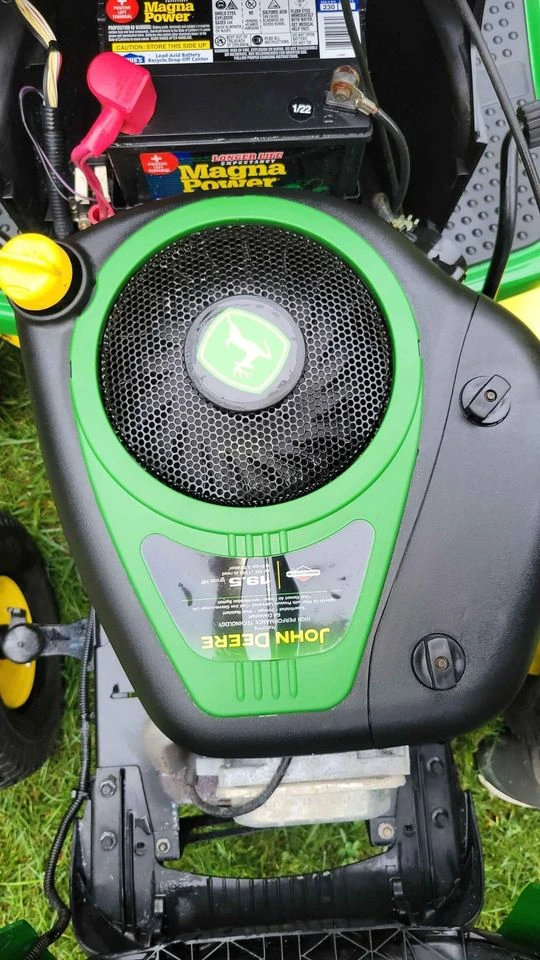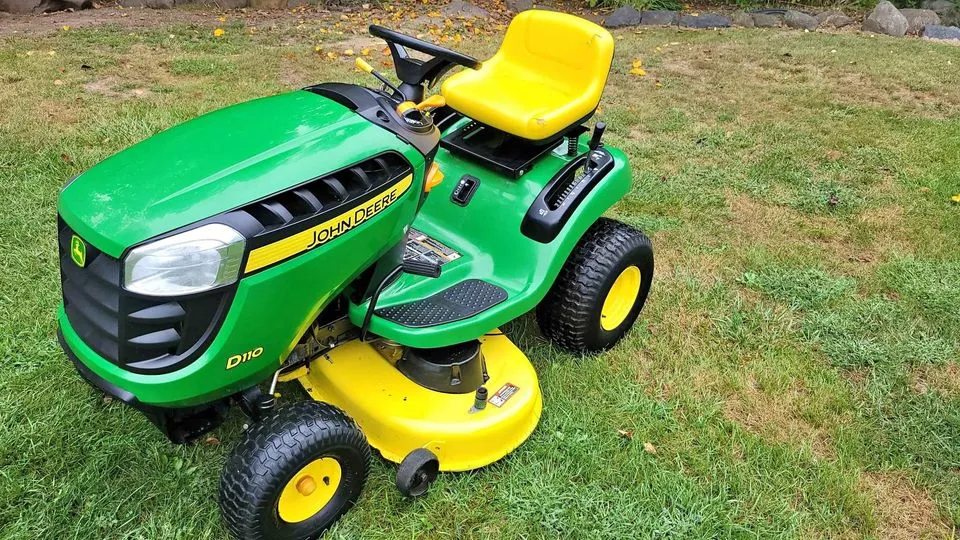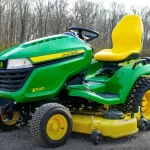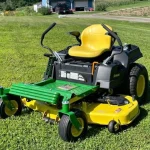The John Deere D110, a reliable workhorse in the realm of lawn tractors, has long been a trusted companion for homeowners looking to maintain their yards with ease.
However, even the most dependable machines can encounter issues that leave their owners scratching their heads. One such frustrating dilemma that many D110 owners may face is the mower’s refusal to start.
Here are the most common reasons:
- Bad Ignition system
- Low level of fuel
- Bad battery
Let’s delve into the post to explore how to diagnose and resolve these problems.
Troubleshooting The Ignition System
The ignition system is often the culprit when it comes to starting issues, so let’s dive into troubleshooting the key components. By following these steps, you’ll be back to smooth starts in no time.
Inspecting The Spark Plug And Ignition Coil
The spark plug and ignition coil play crucial roles in the ignition process. Here’s what you need to know:
Inspect the spark plug: Start by removing the spark plug and examining it closely. Look for any signs of wear or damage, such as fouling or a cracked porcelain insulator. If you spot any issues, it’s time to replace the spark plug.
Check the ignition coil: The ignition coil is responsible for generating the high voltage needed to create a spark. Make sure the wiring connections are secure and free of corrosion. If the connections are sound but the engine still won’t start, it may be time to replace the ignition coil.
Checking The Battery Voltage
A weak or dead battery can also prevent your Deere D110 from starting. Here’s what you should do:
Test the battery voltage: Use a multimeter to check the voltage of your battery. A fully charged 12-volt battery should read around 12.6 volts. If the voltage is lower, you may need to recharge or replace the battery.
Testing The Safety Switches
John Deere lawn tractors are equipped with safety switches that prevent the engine from starting under certain conditions. Follow these steps to diagnose and fix any issues:
Inspect the safety switches: Examine the seat switch, brake/clutch switch, and pto switch for any signs of damage or loose connections. Make sure they are functioning properly.
Test the safety switches: Use a multimeter to test the continuity of each safety switch. If a switch fails the continuity test, it may need to be replaced.
Replacing Faulty Ignition Components
If all else fails, it may be necessary to replace certain ignition components. Here are some possible culprits:
Ignition switch: If the ignition switch is faulty, it won’t send the necessary voltage to the starter solenoid. Consider replacing the switch if it’s not functioning correctly.
Starter solenoid: A malfunctioning starter solenoid can prevent the engine from cranking. Inspect the solenoid for any signs of damage or worn-out contacts. Replace it if necessary.
Wiring harness: A damaged or corroded wiring harness can disrupt the flow of electricity to the ignition system. Check for any obvious signs of wear or corrosion and replace the harness if needed.
Remember, it’s important to follow safety precautions and consult your John Deere manual or a professional if you’re unsure about any of these troubleshooting steps. With a bit of patience and some detective work, you’ll have your John Deere D110 up and running again in no time.
Keep those lawns looking pristine!
Checking The Fuel System

One potential issue that could prevent your d110 from starting is a problem with the fuel system. Checking the fuel system is an essential step in troubleshooting this issue, as it helps identify and rectify any fuel-related problems that may be hindering the starting process.
Verifying The Presence Of Fuel In The Tank
- Ensure there is an adequate amount of fuel in the tank to support the starting process.
- Use the fuel gauge or visually inspect the tank to confirm the fuel level.
- If the tank is empty or low, fill it with fresh fuel to eliminate fuel scarcity as a potential cause for the starting problem.
Inspecting The Fuel Lines For Blockages Or Leaks
- Check for any visible signs of blockages or leaks along the fuel lines.
- Look for cracks, loose connections, or damaged sections that may be affecting fuel flow.
- Clear any blockages by carefully removing debris or obstructions, ensuring a smooth fuel flow to the engine.
Cleaning Or Replacing The Fuel Filter
- Locate the fuel filter, usually positioned along the fuel line.
- Remove the filter and inspect it for dirt, debris, or clogs.
- Clean the filter thoroughly or replace it if necessary, ensuring optimal fuel filtration and preventing fuel delivery issues.
Examining The Carburetor For Clogs Or Damage
- Note the location of the carburetor, typically found near the engine.
- Inspect the carburetor for any visible signs of clogs, such as debris or dirt buildup.
- Ensure that the carburetor is free from damage, cracks, or leaks that may affect its functioning.
- If clogs or damage are detected, clean the carburetor or consult a professional for further assistance.
By following these steps, you can effectively check the fuel system of your mower and address any potential issues. Remember to prioritize safety by working in a well-ventilated area and following the manufacturer’s guidelines. With a properly functioning fuel system, you’ll be well on your way to getting your D110 up and running smoothly once again.
Assessing The Battery And Electrical System
One of the first areas to assess when your mower won’t start is the battery and electrical system.
Here’s a step-by-step guide on how to assess them effectively:
Testing The Battery Using A Multimeter:
- Connect the multimeter’s red probe to the battery’s positive terminal and the black probe to the negative terminal.
- Check the voltage reading on the multimeter. A fully charged battery should register around 12.6 volts.
- If the reading is significantly lower, it indicates a weak or discharged battery that may need to be recharged or replaced.
Checking The Battery Connections For Looseness Or Corrosion:
- Inspect the battery terminals for any signs of looseness or corrosion.
- Tighten any loose connections with a wrench and clean off any corrosion using a wire brush.
- Corrosion can obstruct the flow of electricity, so it’s crucial to ensure the terminals are clean and secure.
Inspecting The Wiring For Damage Or Loose Connections:
- Examine the wiring harness for any visible signs of damage, such as frayed wires or loose connections.
- Ensure that all wires are securely fastened and free from any obstructions or pinches.
- Repair or replace any damaged wires as necessary to ensure proper electrical flow.
Evaluating The Starter Solenoid And Starter Motor:
- The starter solenoid is responsible for engaging the starter motor when the ignition key is turned.
- Check the solenoid for any signs of damage or malfunction, such as corrosion or burnt connectors.
- If the solenoid appears faulty, it may need to be replaced to restore proper functioning.
- Likewise, evaluate the starter motor for any issues, such as worn-out brushes or a faulty armature.
- If the starter motor is at fault, it’s advisable to replace it in order to get your mower up and running again.
By assessing the battery and electrical system using these steps, you’ll have a better understanding of why your John Deere D110 won’t start. Remember to take necessary precautions and consult your owner’s manual for detailed instructions specific to your mower model.
Stay tuned for our upcoming sections on other potential causes and solutions!
Frequently Asked Questions
What Are The Possible Reasons Why My John Deere D110 Won’T Start?
There could be several reasons why your John Deere D110 won’t start, such as a dead battery, faulty ignition switch, clogged fuel filter, or a problem with the starter motor. It’s recommended to check these components to pinpoint the exact issue.
How Can I Troubleshoot A Dead Battery In My John Deere D110?
To troubleshoot a dead battery in your John Deere D110, start by checking the battery connections for any corrosion or looseness. Test the battery with a multimeter to ensure it has sufficient voltage. If the battery is low, try jump-starting it or consider replacing it if it’s too old or damaged.
What Should I Do If The Ignition Switch Is Faulty?
If the ignition switch in your John Deere D110 is faulty, you may need to replace it. Check the wiring connections to ensure they are secure and not damaged. If the switch itself is malfunctioning, it is best to consult the equipment’s manual or contact a professional for assistance in replacing it.
How Can I Determine If The Fuel Filter Is Clogged?
To check if the fuel filter in your John Deere D110 is clogged, disconnect the fuel line and inspect the filter for any debris or dirt. Replace the filter if it appears dirty or clogged. Additionally, check the fuel lines for blockages and ensure the fuel tank has sufficient fuel levels.
What Steps Can I Take If There’s A Problem With The Starter Motor?
If you suspect a problem with the starter motor in your John Deere D110, start by checking the wiring connections to ensure they are secure. Additionally, check for any signs of damage or wear on the starter motor itself. If necessary, consult the equipment’s manual or seek professional assistance for further troubleshooting and repair.
Conclusion
Understanding the basics of your John Deere D110’s starting process can greatly assist in troubleshooting and resolving any problems that may arise. By following these steps and keeping up with regular maintenance, your John Deere D110 will start smoothly and reliably, ensuring your lawn care tasks are completed efficiently.
Related Posts:




